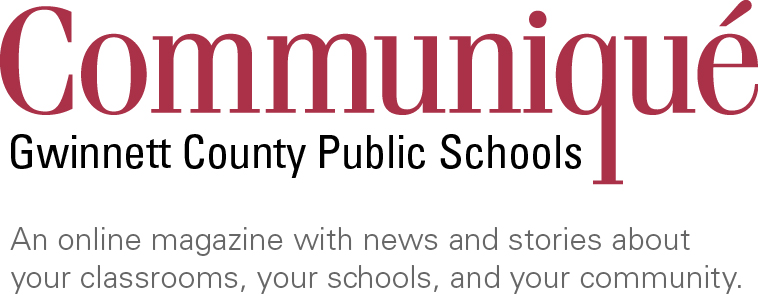Jamie McFarland, who teaches children with severe and profound disabilities at Rock Springs ES, was named GCPS’ top teacher on Nov. 10. Following are her reflections on her career, special education, and advice for families and prospective teachers. Click the video to hear more and get a peek inside her classroom.
What's been your greatest moment in a GCPS classroom?
I don’t have one single “great” moment in a GCPS classroom. The little moments are my greatest moments in my classroom. [They are] the seemingly small moments when my students reach milestones that they were never “supposed” to be able to do are great moments. The moment when an entire class of general education students says that they want one of my students to sit at their table for our activity is a great moment. The moment when one of my nonverbal students spontaneously uses his device to tell me what he wants or to answer a question is a great moment. The moment when one of my students nods her head to tell me “yes” for the first time is a great moment. The hugs, fist bumps, and “I love yous” from students who know I love, care about, and truly believe in them are some of my greatest moments in my classroom.
As a special education teacher, how do help your students fulfill their promise?
I help my students fulfill their promise by treating my students and their families like they are important, like I believe in them, and like anything is possible for them. I believe that nothing is impossible for my students, no matter what their diagnosis may be or what doctors may have said in the past. My students may not learn to do things in the same way as their typically developing peers, but I am committed to figuring out a way for them to be involved and a way for them to learn. It might mean using assistive technology in order to help them communicate, finding a gait trainer that will assist in walking, or finding a way for them to be involved with their friends. It takes an incredible amount of time and energy, the ability to ‘think outside the box’, and an immense amount of passion and love for the students.
What do others not "get" about special education?
Special education is not child care. My students are learning not only functional academics, but also how to communicate, how to interact with others, and how to take care of themselves and function as independently as possible. One of my favorite quotes is, “Not being able to speak is not the same as having nothing to say”. People don’t “get” that even though many of my students are not able to speak, they have so much to say and to offer. They understand so much more than most people give them credit for and they have their own thoughts, feelings, and emotions.
What advice would you give to parents whose child receives special education services?
I would tell parents to remember that they know their child best. I would remind them that they are a crucial part of their child’s educational team and that they should communicate their hopes and dreams for their child to their child’s teacher. I would ask them to stay involved with the school, ask what is going on at school, and share important things that are going on at home with their child’s teacher. Most importantly, I would tell parents that no matter what anyone has said, their child is important, valuable, and deserves the very best education.
What advice would you give to a high school or college student who's thinking about becoming a teacher?
To anyone who is planning to be a special education teacher, I would say for them to spend time with the families of children with special needs so that they can have a better understanding of the families that they will be working with. I think that one of my greatest strengths as a teacher is the relationship I form with families and I developed that strength out of time spent in the day to day life of families of children with special needs.
What do you hope to see when you look back on your teaching career?
When I look back on my teaching career, I hope to see my students involved and accepted by their peers and in society as a whole because of the work that I did with my students as well as students in the general education population. I hope to see my students having jobs and included in their communities.

